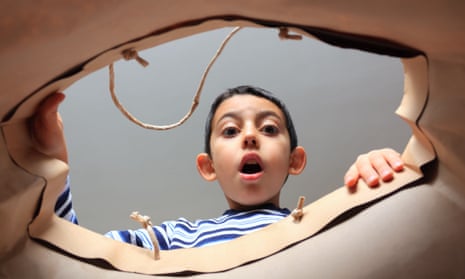Eight-year-old Finley has always had things tough. He has autism and a bowel condition, and is scared by crowds and noise. Finley’s mum, Lisa, is disabled and does the best she can, but the costs are colossal. Finley’s special nappies alone cost £60 a month. Since Lisa became too ill to work, social security has been their lifeline – from specialist food to keep Finley healthy to therapy toys to make him less anxious.
Then universal credit came in. The inbuilt six-week wait stopped the family’s only income – “[It] left me with literally no money in that time,” Lisa says – and her benefits now vary month to month.
What’s more, under universal credit, disabled kids like Finley are seeing their child disability payment cut in half – that’s a loss of more than £1,750 a year – and Lisa has had to start using her own disability benefits to top up Finley’s.
The family car recently broke down and they were housebound as they saved to fix it. Respite care for Finley – a precious breather for both him and Lisa – has ended. Even Christmas has to be rationed.
“We’ve had to limit Finley’s expectations about Christmas, saying that Santa will bring one or two presents this year,” Lisa says. “We’re not taking him to see Santa in the runup to Christmas because we can’t afford it.”
You’d be forgiven for thinking this was some sort of Scrooge-like parody of so-“welfare reform”: wealthy Conservative ministers withholding Christmas presents from sick and disabled kids. But Finley’s case is brutally common: 40% of disabled children are now so poor they’re going without Christmas and birthday presents, according to research out this week by the charity Contact into the cost of childhood disability. Read through Contact’s study and it shows unflinchingly the reality for Britain’s disabled children, where austerity has cut so deep that a quarter of families with kids with disabilities are skipping meals, while almost seven in 10 are going without new clothes.
The study shows many disabled children are even going without hospital appointments and becoming sicker as a result – like Finley, they need to see a doctor but their parents are too poor to afford the transport to get there.
The critical underfunding of Britain’s disabled people is now well documented. But the maltreatment of disabled children is rarely discussed – a sort of national secret too shameful to admit. A cocktail of cuts and longstanding inequalities is seeing families with disabled kids facing widespread hardship, placing enormous stress on parents and robbing vulnerable children of their health, security and comfort.
Across the board, disabled kids are being hardest hit by austerity, from losing payments under universal credit and the closure of respite centres, to the crisis in special educational needs. The charity Scope is now so concerned that it is currently calling on the government to introduce the first ever minister for disabled children and families.
It emerged this month that thousands of disabled children’s lives are at risk after being denied vital equipment by cash-strapped councils. The charity Newlife found more than eight in 10 local authorities were using unlawful “blanket bans” for disabled children – where councils ration shrinking budgets by refusing to provide equipment such as wheelchairs or walking frames in any circumstances, irrespective of the child’s medical need.
This strain is only set to mount in the coming years: by 2021, the Equality and Human Rights Commission calculates all households with a disabled child and a disabled adult will shoulder losses of more than £6,500 a year.
It is the definition of a safety net gone wrong, in which the very group in society that most needs to be nurtured and cared for is being discarded and harmed. As one parent struggling to pay the bills put it to Contact: “Benefits should be there to help people, not make us feel like scroungers and thieves. We’re missing quality time with our terminally ill child, all because of money.”
The government is not so much turning a blind eye to this suffering as turning it into a photo-op. As need goes up this winter, the Christmas season is seeing a trend of Conservative MPs posing at food banks; the latest being the former Brexit secretary Dominic Raab. The nerve of this is staggering, as if a criminal returning to the scene of a crime, but it shows clearly how the most nightmarish of things – say, a disabled children going hungry – can embed itself into reality.
The rhetoric that has so successfully scapegoated disabled adults in recent years – that we are fakers, scroungers, leeches – cannot, even by its most zealot critics, be levelled at disabled children. Instead, such a social crisis takes hold through a combination of disconnect and normalisation. Politicians publicly lament the sad sight of “struggling” families at food banks while pretending no one has noticed that their policies caused it. The public can put a pound in a children’s charity tin while voting in governments that cut funding for disabled kids.
There is a time in every society where we have to make an active choice for something better – to challenge politicians who dare to balance budgets on the backs of the poor and disabled. It is not a festive cliché to suggest Britain needs to refind its compassion and fund a welfare state with care at its heart. Otherwise, no one is safe. Not even disabled children.

